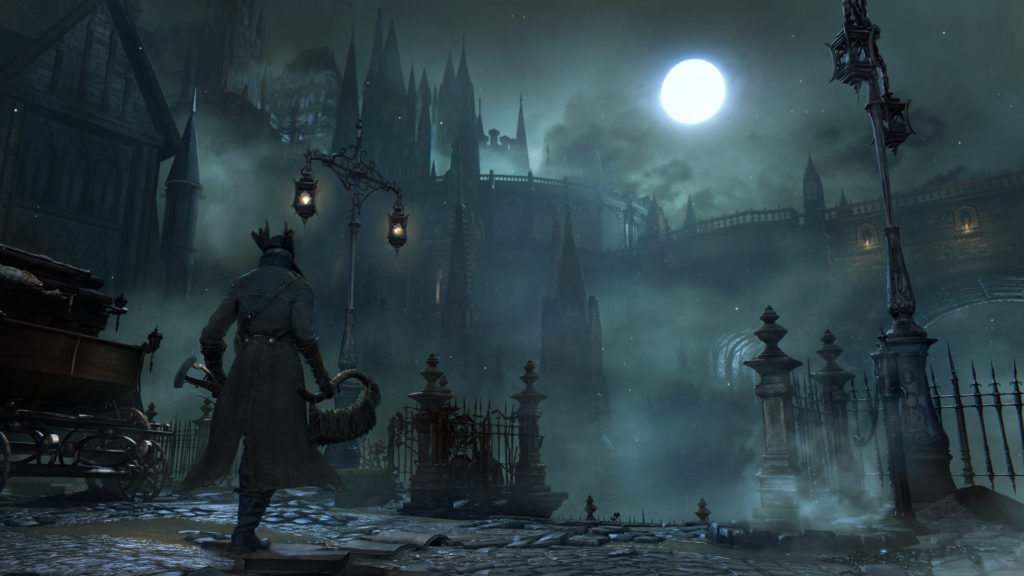“What do I play now?”
I would call this the perennial question of video games. After playing Bloodborne for 60+ hours (a game that I absolutely LOVE – more on that in a few weeks), I’ve ended up in this weird twilight state where I’m not sure what to do with myself. Will any other game really compare favorably with what I just played? Probably not – and that’s the downer. Some games simply resonate with you, for whatever reason, and it’s hard to get yourself out of their mindset once you finished. Can other games engross me as much as Bloodborne?
Thus, I end up flitting to and fro between multiple games, hoping something will catch my eye and motivate me to play something new. This is nothing new for me, because Souls games have created this cycle – purely engrossing action-RPG, followed by a whole lot of wandering and searching for something that fits the mood thereafter. In one way, it feels a bit like dabbling and procrastination, as if I’m not going to commit to something if it doesn’t grab me immediately. Another, more terrible way to look at it is that I have the attention span of a gnat or similar winged insect. I don’t like to think of myself that way! Or, we could call it the paralysis of indecision based on having far too many options.
But, really, I think there’s something to be learned from this. A long game takes a long time for me to decompress and get used to how other games are designed. And lately, I’ve mostly been playing games that are, for all intents and purposes, rather similar. Playing Dark Souls II, III, and Bloodborne all in the same year has to be some sort of record, because that’s an insane time dump any way you look at it. Jumping to another genre seems a necessary task at this point, because you eventually get tired of playing the exact same kind of experience again and again.

My quest, then, is to play games that I know I’m not exactly sure about! Just for example, I haven’t played any of those Arkham games in a while, so I decided on a whim to play Arkham Origins (and buy Arkham Knight, because it’s like ten dollars now that the hype died). As you might know, my previous experiences with Asylum and City weren’t 100% positive, but time and distance can change a lot. Out of all the open world games I’ve played in recent memory, these are the ones that, despite their faults, come to mind when I think of those games done well. And so, bizarrely enough, I figured four years was enough time and distance to make them enjoyable again. I hope I’m right!
You might think this is weird, but imagine it in this sense: because of my current gaming habits, I have absolutely zero objectivity as to what constitutes a “good” or “bad” game. This makes for excessively boring writing, I can assure you. Praising something for what it does well requires little effort on my part – figuring out why a game doesn’t quite work takes a lot more critical faculties to actually convey in word form. I haven’t really played something I disliked in a long time, and that has made me a bit bored and staid in the gaming realms, as least as far as writing goes.
Just for example, I realized that the Arkham series is one of the only open world games I’ve yet to find with a difficulty setting that the player can adjust. Honestly, that even sounds weird to type in this age of automatically adjusting difficulties and “even” experiences for everyone, but it’s something I appreciate. That the developers would even bother to let me set my own pace for the game (note: I choose Hard for all of these games) speaks to a trust in the person playing to know what they can deal with at any given time. Most games in this genre just end up being incredibly easy, but Batman games still work as games (well, not the best ones, but you get the idea).

Just for example, the first boss fight in Arkham Origins against Killer Croc took me approximately five tries to get down. With the amount of damage you take on Hard, it turns into an intense fight of pattern prediction and crowd control. Once multiple enemies start coming into the fray, you’re desperately trying to avoid getting hit, missing a parry, or evading an unblockable attack from several foes. The margin of error, even for the very beginning of the game, struck me as incredibly slim; at no point did it feel fundamentally unfair, other than the sometimes uncooperative camera (a mainstay of this series’ combat situations, but I suppose that’s a victim of the open world design).
I didn’t expect to find a decently designed boss fight in an Arkham game – and it’s not perfect by any means – but Origins is actually an improvement in its first hour. Will that extend to the rest of the game? That’s the exciting thing – I honestly don’t know! But time and distance can fix a lot, really, when it comes to enjoyment, or lack thereof, in video games. Think of it like this: sometimes, you need to do things you may not necessarily want to do, in order to provide context for those things you enjoy doing. I imagine most media is like this!
But that’s true of life as well. God tells Abram to simply leave Ur, his home, and take everybody with him. He’s just supposed to go to Canaan, and never return, due to God’s promise. Think about how weird this is – he has to leave the comforts of life where he lived and travel to a completely unknown land, in control of many lives, based on the seeming whims of a mystical sky being (as our more skeptical critics today might call Him). And yet, Abram just does this, and then does a whole lot more things that God says – to his credit. I mean, God basically says this:
Now the Lord said to Abram,
“[a]Go forth from your country,
And from your relatives
And from your father’s house,
To the land which I will show you;
2 And I will make you a great nation,
And I will bless you,
And make your name great;
And so [b]you shall be a blessing;
3 And I will bless those who bless you,
And the one who [c]curses you I will [d]curse.
And in you all the families of the earth will be blessed.”
And Abram’s just so motivated to simply go, without any pondering of the consequences or reservations. The Bible doesn’t care to mention them, either, like it does with so many other figures even in Genesis. Abram believes, no doubt, that God is the true God, the One and Only – he’s willing to venture out into the unknown, and that’s credited to him as righteousness.
I think it’s worth evaluating when we get into a rut – what should we be doing? Are we playing it too safe? Do we need to step out of our comfort zones? Those are questions only you can answer, but it may be a pretty obvious answer…
